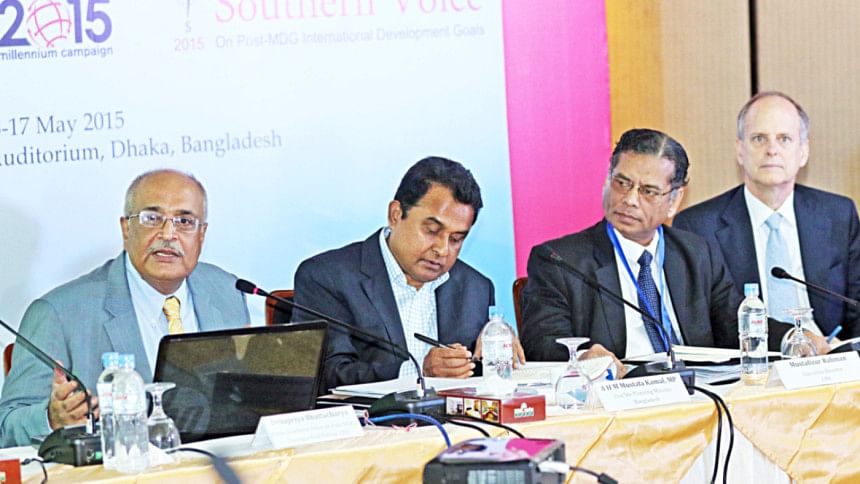Raise revenue for new development agenda

Analysts yesterday urged the policymakers of developing countries, including Bangladesh, to shore up efforts to raise revenue collection and accelerate investment and intra-regional trade to attain the post-2015 development targets.
The call came at the opening of a two-day Expert Group Meeting (EGM) on Asian Partnership in Financing Sustainable Development Goals at Brac Centre Inn.
SDGs are the next global development agenda after the expiry of Millennium Development Goals (MDGs) later this year.
The Centre for Policy Dialogue in association with Southern Voice on Post-MDG International Development Goals and the UN Millennium Campaign organised the discussion on financing SDGs.
There are 17 overarching goals and 169 targets in the SDGs compared to only eight goals in the MDGs, which mainly focused on the poor in the low-income countries.
The suggestions were placed noting the declining flow of aid from developed countries, and gradual reduction of aid dependence by a number of developing nations, including Bangladesh.
The context of financing changes fast with the falling dependence of developing countries on overseas development assistance (ODA), said Debapriya Bhattacharya, distinguished fellow of CPD.Subsequently, domestic resource mobilisation, private investment and foreign direct investment will become vital in achieving the SDGs, he added.
Citing the past outcomes on financing, Bhattacharya said SDGs have to be financed mainly by domestic resources and not by ODAs. He stressed the need for enhancing revenue administration through modernised progressive tax systems, improved tax policy and more efficient tax collection.
To combat illicit financial flows there is a need to strengthen national regulation and international cooperation, he said. But ODA will still have roles, he said, adding that developed countries should fulfil their commitment to allocate 0.7 percent of their gross national incomes as ODA to developing countries.
Political commitment and institutional arrangement are also vital, said Bhattacharya, also the chair of the Southern Voice on Post-MDG International Development Goals network.
Sultan Hafeez Rahman, executive director of Brac Institute of Governance and Development, said the developed countries did not deliver on their commitments to give 0.7 percent of their GNI.
“Forget it. It has not happened and will not happen,” he said, while calling for an increase in domestic resource mobilisation. Private investment and foreign direct investment will be important during the process of transformation, he said, adding that trade can do a great deal for development and support the achievement of SDGs.
Arastoo Khan, member of Planning Commission, said engaging the private sector will be important in achieving the SDGs. Khan said intra-regional trade accounts for just 4 percent of total trade in South Asia. “That is not good at all,” he added.
Salman Zaidi, poverty global practice manager of the World Bank's East Asia and Pacific region, said the multilateral lender has been working with other development banks and the International Monetary Fund to frame a paper on the post-2015 agenda. Lee Yun-young, South Korean ambassador to Bangladesh, said public private partnership is important in promoting growth.
Robert Watkins, UN resident coordinator and UNDP resident representative in Bangladesh, said the impact of the MDGs has been dramatic in Bangladesh and the country has been recognised, along with Cambodia, this year as the top performing LDC in MDG attainment.
Noting Bangladesh's steady economic growth and poverty reduction, he however said reliance on this economic model widens income disparities and, in turn, also widens social, gender, rural-urban and regional disparities.
“This is not a theory -- it is empirical. Bangladesh is in danger of development progress that benefits the rich while the poor are left behind.”
Planning Minister AHM Mustafa Kamal said the developed countries, including the US, should remove all restrictions on exports and allow free movement of people from developing nations, including Bangladesh, to help fight hunger and attain SDGs.
“I have seen in the newspaper that even today people are stuck in the middle of the sea -- they were not allowed to get off from the vessels.”
Bangladesh would be able to attain development goals if the bar on the export and movement of people for jobs are waived, he said. The move will benefit both Bangladesh and the migrant recipient country.
“We are objectively moving forward to achieve our targets. Our approach is to sustain the growth.”

 For all latest news, follow The Daily Star's Google News channel.
For all latest news, follow The Daily Star's Google News channel. 



Comments